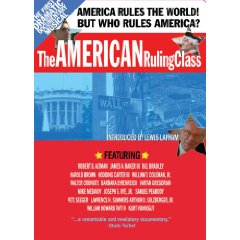
![]() Truly Remarkable–Provokes & Entertains
Truly Remarkable–Provokes & Entertains
This DVD is superb and also subversive. I doubt that the “stars” in this movie, particularly James Baker, Bill Bradley, Howard Brown, and Larry Summers, really knew what they were getting into, since their words–and their bland denials–ring so false in this context.
I put the film in while trying to deal with Microsoft's latest “update” that cost me half the morning, and I recommend it very strongly as a Christmas present or for classrooms and book clubs.
My notes:
+ A Peabody, whose ancestors came on “the boat” and also founded Groton, laments that whereas all the leaders used to pass through Groton, now there is no real “source.” I am reminded of Lee Iacocca's Where Have All the Leaders Gone?.
+ Hedge fund visits basically boils all ownership in America down to four banks, and later in the film we learn that six multinational control almost all “content.”
+ We are specifically told by a financial journalist that the concentration of wealth in America is now back to 1929 levels (this was in 2006 or so, talk about a signal for the future depression!
+ Although I think of myself as a Reagan Republican (and Libertarian) I never liked his use of the military to break the unions, and now I am very troubled by the discussion of the 1970's as the era in which big money broke the backs of the unions. See also State of the Unions: How Labor Can Strengthen the Middle Class, Improve Our Economy, and Regain Political Influence.
+ Barbara Ehrenreich, author of Nickel and Dimed: On (Not) Getting By in America makes an appearance here and talks about how the underclass is living in a “constant state of emergency.” This is heart-breaking and precisely the kind of thing that the White House and Congress refuse to address.
+ The discussion of the Council on Foreign Relations )CFR) established $500,000 as the minimal annual income for entry into the outer circle, and I suspect it is really closer to $2-3 million these days, the dollar being worth half what it was in the 1970's.
+ The cameo appearances by both the elites and the counter-elites (e.g. Howard Zinn) have been brilliantly orchestrated. As Joe Nye and others speak I think “best of the servant class.”
+ The movie specifically addresses the question of war as profit, and I am bemused by the straight faces of the ostensible elite (actually just the top rung of the major domo line) as they deny thing. See as a minimum War is a Racket: The Antiwar Classic by America's Most Decorated Soldier and The Fifty-Year Wound: How America's Cold War Victory Has Shaped Our World.
+ Hodding Carter is interesting to me as he talks about how Lucifer always takes one on a tour of the mountain top, and then concludes that if you go into the elite you must on the one hand forget most of what you learned about doing good for others; and on the other hand, will die, not wishing for more money, but for having done your time differently.
+ The East Coast portion of the movie ends on the note of “doing well is not the same as doing good.”
+ In Texas we hear about how the national interest will always remove all moral obstacles to self-interest, and with James Baker and others, explore the bomb-profit index. See also Confessions of an Economic Hit Man and The Shock Doctrine: The Rise of Disaster Capitalism.
+ Great line: “You can't fight City Hall, but you can buy it.” In fairness to those doing the buying, my sense is that those being bought are the ones asking for the money.
The movie ends with a very inspiring walk down a country lane and the discussion of how the banks are like rocks in a big basket, and the other basket is being filled by teaspoons of sand, much of it leaking, as the many race against the few to achieve a balance of power. Powerful. See also The Fortune at the Bottom of the Pyramid, Revised and Updated 5th Anniversary Edition: Eradicating Poverty Through Profits and A Power Governments Cannot Suppress.
Both Zinn and Perkins are in this movie, the one wish I would have of any future issuance is that it include text showing the name of the person, half of them were NOT easily recognized in the single use of their name verbally.
The alternate ending includes a childrens' chorus from Camp Thoreau, and a Demopublican such as discussed in Grand Illusion: The Myth of Voter Choice in a Two-Party Tyranny and my own Election 2008: Lipstick on the Pig (Substance of Governance; Legitimate Grievances; Candidates on the Issues; Balanced Budget 101; Call to Arms: Fund We Not Them; Annotated Bibliography).
You can find all of my reviews more easily accessed within 98 categories (e.g. Democracy, Pathology of Power, Secrecy and the Politics of Secrecy) at Phi Beta Iota the Public Intelligence Blog, all with links leading back to Amazon, but vastly easier to exploit than here.
Related:
Full video available free at Hulu




